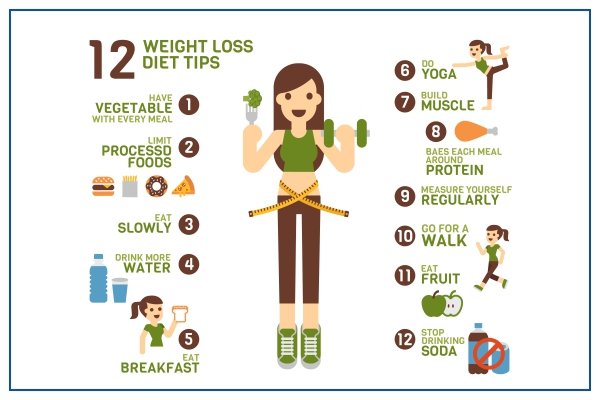
Obesity is a serious health problem that affects millions of people worldwide. It is linked to a number of chronic diseases, including heart disease, stroke, type 2 diabetes, and some types of cancer. If you are overweight or obese, there are a number of things you can do to reduce your risk of these diseases and improve your overall health.
Here are some tips on how to reduce obesity:
Eat a healthy diet. This means eating plenty of fruits, vegetables, and whole grains. It also means limiting processed foods, sugary drinks, and unhealthy fats.

Be physically active. Aim for at least 150 minutes of moderate-intensity aerobic activity or 75 minutes of vigorous-intensity aerobic activity each week. You should also do muscle-strengthening activities that work all major muscle groups on two or more days a week.
Make gradual changes. Don't try to change too much too soon, or you are more likely to get discouraged and give up. Start by making small changes to your diet and exercise habits, and gradually increase the amount of change you make over time.
Here are some specific tips for making healthy changes to your diet and exercise habits:
Diet

Eat plenty of fruits and vegetables. Aim for at least five servings per day. Fruits and vegetables are low in calories and high in nutrients, and they can help you feel full and satisfied after meals.
Choose whole grains over refined grains. Whole grains are more nutritious than refined grains and can help you feel fuller longer.
Limit processed foods. Processed foods are often high in calories, unhealthy fats, and added sugar.
Drink water instead of sugary drinks. Sugary drinks are high in calories and can contribute to weight gain.
Limit unhealthy fats. Unhealthy fats, such as saturated and trans fats, can raise your cholesterol levels and increase your risk of heart disease.
Exercise
Find activities you enjoy. If you don't enjoy your workouts, you are less likely to stick with them.
Start slowly and gradually increase the intensity and duration of your workouts over time.
**Set realistic goals. Don't try to do too much too soon.
Find a workout buddy. Having someone to work out with can help you stay motivated.
If you are struggling to reduce obesity on your own, talk to your doctor or a registered dietitian. They can help you develop a personalized plan that is right for you.
Here are some additional tips that may help you reduce obesity:
Get enough sleep. When you don't get enough sleep, your body produces more of the stress hormone cortisol. Cortisol can lead to weight gain, especially around the abdomen.
Manage stress. Stress can lead to unhealthy eating habits and weight gain. Find healthy ways to manage stress, such as exercise, yoga, or meditation.
Be patient. It takes time and effort to lose weight and keep it off. Don't get discouraged if you don't see results immediately. Just keep making healthy choices and you will eventually reach your goals.
Reducing obesity is not easy, but it is possible with hard work and dedication. By following the tips above, you can improve your health and reduce your risk of chronic diseases.